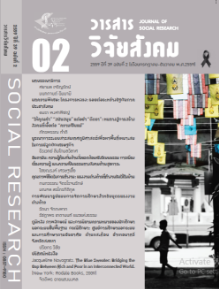การพัฒนารูปแบบการจัดการศึกษาสำหรับบุตรแรงงานต่างด้าว
Main Article Content
บทคัดย่อ
งานวิจัยมีวัตถุประสงค์เพื่อ ศึกษาสภาพการณ์ปัจจุบันด้านการบริหารจัดการศึกษา ปัญหาและอุปสรรค ตลอดจนการพัฒนารูปแบบการจัดการศึกษาสำหรับบุตรแรงงานต่างด้าว ดำเนินการวิจัยแบบผสมผสาน โดยการวิจัยเชิงปริมาณ เก็บข้อมูลจากบุตรแรงงานต่างด้าวที่กำลังศึกษาในจังหวัดสมุทรสาคร จำนวน 400 คน และวิจัยเชิงคุณภาพ เก็บข้อมูลจาก เจ้าหน้าที่ระดับนโยบาย องค์กรพัฒนาเอกชน ผู้ปกครอง ผู้บริหารสถานศึกษา ครูผู้สอน เด็กนักเรียน และคนในชุมชน เครื่องมือที่ใช้ในการวิจัยคือแบบสอบถามและแบบสัมภาษณ์ วิเคราะห์ข้อมูลโดยใช้ค่าเฉลี่ย ส่วนเบี่ยงเบนมาตรฐาน ดัชนีความสำคัญของลำดับความต้องการจำเป็น รวมทั้งการวิเคราะห์เนื้อหาจากการสัมภาษณ์
ผลการวิจัย พบว่า 1. ข้อมูลเกี่ยวกับการจัดการศึกษาที่ไม่ทราบมากที่สุดคือเรื่องของค่าใช้จ่ายในการเรียน ขณะที่ข้อมูลที่ทราบมากที่สุดคือเรื่องของหลักสูตรการเรียน การสอน ในด้านข้อมูลที่ต้องการทราบมากที่สุด คือ เรื่องแนวทางการศึกษาต่อในระดับที่สูงขึ้น เรื่องของจำนวนครูที่ดูแลเป็นปัจจัยที่ส่งผลกระทบต่อการจัดการศึกษามากที่สุด รวมถึงด้านนโยบายการศึกษาเป็นเรื่องที่มีความจำเป็นสูงที่สุด 2. การพัฒนารูปแบบการจัดการศึกษา ต้องคำนึงถึงองค์ประกอบ 11 ด้าน ได้แก่ 1) กฎหมายและนโยบายการศึกษา 2) ครูผู้สอน 3) การเรียนการสอน 4) การมีส่วนร่วมของชุมชน 5) การเตรียมความพร้อมของนักเรียน 6) ค่าใช้จ่ายในการเรียน 7) สื่อการสอน 8) เนื้อหาหลักสูตร 9) การติดตามและประเมินผล 10) ผู้ปกครอง และ 11) การบริการต่างๆ เกี่ยวกับการเรียนการสอน ซึ่งเป็นรูปแบบที่ผ่านการประเมินโดยผู้ทรงคุณวุฒิ โดยผลการประเมินทุกด้านได้ค่าเฉลี่ยมากกว่า 3.50 ซึ่งถือว่ารูปแบบดังกล่าวอยู่ในระดับที่ใช้ได้
The Development of an Educational Management Model for Migrant Children
Research objectives cover the following: 1) to study current situation of education management for migrant children, 2) to study problems and obstacles in managing education and 3) to develop a model of education management for migrant children. The research methodology applies a mixed method research. While quantitative approach collects data from 400 migrant children, qualitative approach gathers information from students, students, government officer, NGOs, parents, school administrators, teachers, students and people in the community. The instrument in this research contains questionnaires and an interview guideline. The data is analyzed, utilizing ratio, average, standard deviation, and modified priority needs index (PNI Modified), as well as content analysis.
The research findings are summarized as follows: 1. The most un-known information on education management was the cost of education, while the most well-known data was the school curriculum. The most wanted information was plans to pursuit higher education. The cost of current education was the top ranked issue of discussion, whereas issue on community’s participation in education was ranked last. The number of teachers in charge was the most influential factor that impacts education management. Also, regulations and policies on education were the most necessities. 2. The development of education-management models for migrant children must consider 11 components: 1) Policies and Regulations on Education for migrant children 2) Teachers 3) Teaching 4) Community’s participation in education management 5) Children Preparation 6) Cost of Education 7) Instructional Media 8) Curriculum for migrant children 9) Monitoring and Evaluation 10) Migrant children’s parents, and 11) Services Learn about education which should be assessed by qualified persons, with average comprehensive evaluation higher than 3.50. The said pattern is regarded as feasible.
Article Details
1) บทความนี้เป็นลิขสิทธิ์ของสถาบันวิจัยสังคม จุฬาลงกรณ์มหาวิทยาลัย แต่ความคิดเห็นและเนื้อหาเป็นของผู้แต่ง
2) ทัศนะและข้อคิดเห็นในวารสารวิจัยสังคมเป็นของผู้เขียนแต่ละท่าน มิใช่ทัศนะและข้อเขียนของกองบรรณาธิการฯ หรือสถาบันวิจัยสังคม จุฬาลงกรณ์มหาวิทยาลัย ผู้ประสงค์จะนำข้อความใดๆ ไปผลิต / เผยแพร่ซ้ำต้องได้รับอนุญาตจากผู้เขียนและกองบรรณาธิการวารสารวิจัยสังคม ว่าด้วยกฎหมายลิขสิทธิ์

